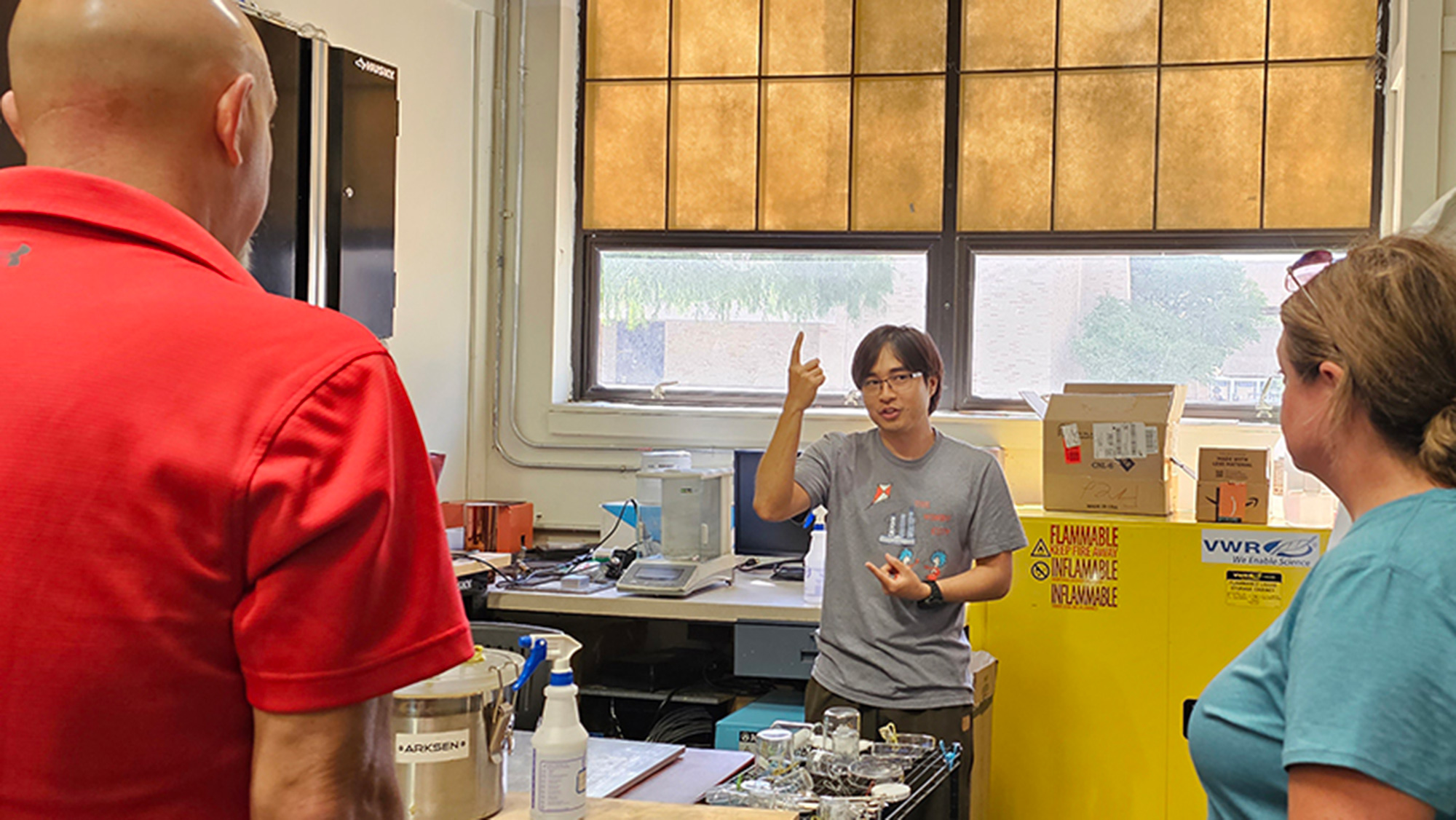Each summer, secondary STEM education teachers from across Texas converge on the Texas A&M University campus to participate in engineering research experiences with faculty and graduate students from across several disciplines in the College of Engineering.
The Enrichment Experiences in Engineering (E3) program is a three-week summer residential engineering research experience for secondary educators in mathematics, science, computer science and career and technical education (CTE). Through their research experiences, educators design a classroom project to bring back to their classrooms in the new school year. The goal is for these educators to introduce new engineering concepts to their students, increase student awareness of engineering and encourage students to consider an engineering career.
“The overall mission of the E3 program is to excite, empower and educate teachers about engineering so they, in turn, will excite, empower and educate students and other teachers they come in contact with each day,” said Shelly Tornquist, director of Spark! PK-12 Engineering Education Outreach. Spark! hosts the program each summer.
In addition to the information and education brought back to their classrooms, E3 participants are introduced to experiences with the latest engineering research and can enhance their laboratory skills and techniques.

“The greatest value-added aspect that I always get from these research experiences is the ‘headspace’ that I'm in when I leave the experience,” said Chip Brown, an educator with over 10 years of experience who teaches at Dekaney High School in Spring Independent School District (ISD). “I enjoy the opportunity to sit with deep thinkers and ‘up my game’ in my skills to think and analyze. This group was no different. I will return to my classroom with deeper thinking skills and a great experience that I will be sharing with my students.”
Brown designed lesson plans introducing engineering ethics into the high school classroom with assistance from Dr. Bimal Nepal, professor in engineering technology and industrial distribution; Dr. Debjyoti Banerjee, professor in mechanical engineering; Dr. Michael D. Johnson, professor in engineering technology and industrial distribution; and Dr. Glen Miller, instructional associate professor in philosophy and humanities.
In addition to working with engineering faculty and researchers, educators participate in daily discussion time with educational specialists and master teachers to help in the transfer of engineering research into math, science and CTE classroom projects.
“This experience has helped me grow as a teacher by building my professional development. I can take all the lessons I have learned in the afternoon professional development sessions with the instructors as well as the hands-on trainings in the labs,” said Esmeralda Hernandez who teaches introduction to engineering design and precalculus at Jubilee Academies - Brownsville. “I was able to receive trainings from so many skilled professionals that will definitely benefit me in my career as an educator.”
Hernandez worked with Dr. Amir Asadi, assistant professor in engineering technology and industrial distribution and manufacturing and mechanical engineering technology. Hernandez’s research project focused on the effect of interface adhesion on the performance of carbon fiber composites. She plans to take this experience back to her classroom, where her students will be layering polymer adhesions on different material composites to compare their strengths and strain.
It is a big sacrifice taking a small portion of your summer vacation off but so worth it. The training you receive, plus the knowledge you gain, aren't comparable to what you will learn anywhere.
E3 empowers teachers with the essential skills to effectively integrate their research experience into classroom settings, aiding in the development of engineering project-based lesson plans.
“I hope this experience will benefit my students by giving them a different perspective of engineering,” said Mara Nettles, an educator with 10 years of experience who teaches at Roberson Middle School in Spring ISD. “I hope they gain an appreciation for all of the different disciplines that make up engineering. I hope they discover a career they are passionate about and dive in full force. Lastly, I hope the experiences I bring back to them from E3 will help influence their career paths and improve their futures.”
Nettles worked with Dr. Dorrin Jarrahbashi, assistant professor in mechanical engineering, on a lesson plan where Nettles’ students will study, analyze and compare Cellulose Nanocrystal (CNC) properties in solutions of high concentrations, low concentration and no CNC concentration.
After successfully completing the program and implementing the engineering project in their classrooms, teachers are required to share their knowledge with others. They can achieve this by training two fellow teachers in similar positions within their school or district. Alternatively, they can showcase their lesson plan at a STEM conference.
For educators interested in participating in the E3 program, Hernandez offers the following advice.
“It is a big sacrifice taking a small portion of your summer vacation off but so worth it,” Hernandez said. “The training you receive, plus the knowledge you gain, aren't comparable to what you will learn anywhere. You will also meet new teachers who give you great advice, great stories and new teaching strategies.”
If interested in the 2024 E3 program, June 10-28, please visit tx.ag/TAMUE3.